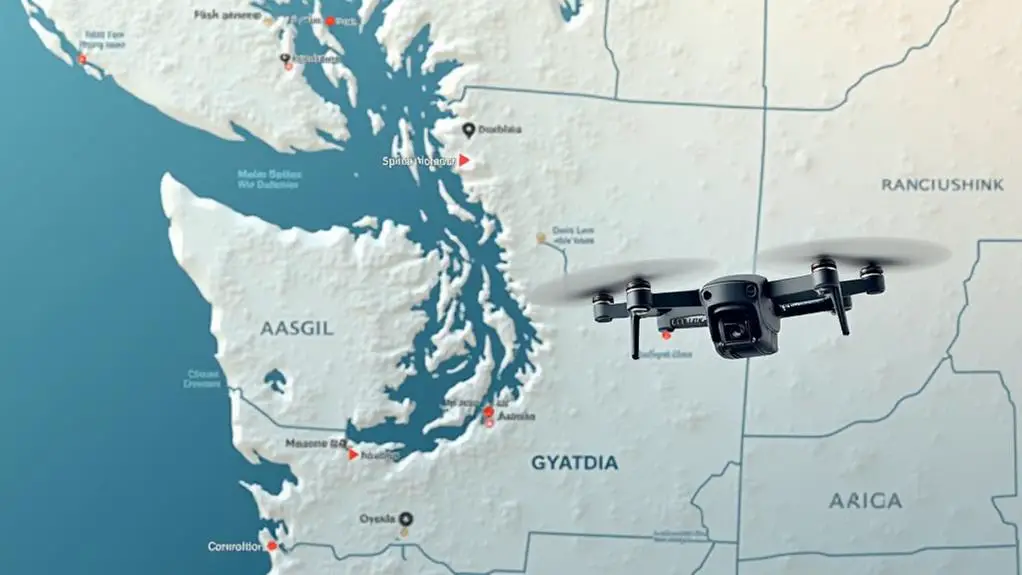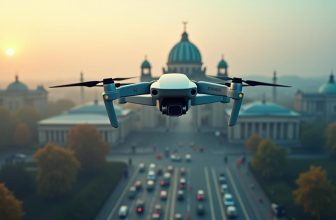
It's not exactly a walk in the park when it comes to flying a drone in Washington – there are rules you need to follow to avoid any, shall we say, 'turbulent' situations. If you're planning to take to the skies with your drone, you'll need to know about the seven key laws governing its use. These laws cover everything from registration requirements to no-fly zones, and non-compliance can result in serious penalties. So, what exactly do you need to do to stay on the right side of the law? Let's take a closer look at the specifics.
Contents
Key Takeaways
- In Washington, drones weighing more than 0.55 pounds must be registered with the Federal Aviation Administration (FAA).
- Drone operators must maintain a visual line of sight and stay away from airports, national parks, and restricted airspace.
- Commercial drone operation in Washington requires a remote pilot certificate with a small unmanned aircraft systems (sUAS) rating from the FAA.
- National Parks, wildlife refuges, military bases, and national security sensitive areas are off-limits to drones in Washington.
- Drone pilots must be at least 16 years old and respect individuals' right to privacy, avoiding flights over private property without permission.
Registration Requirements for Drones
In Washington, drone owners must navigate a regulatory framework that includes registration requirements, which serve as a critical component of the state's broader efforts to promote safe drone operations.
You must register your drone if it weighs more than 0.55 pounds and less than 55 pounds, and you plan to use it for recreational or commercial purposes. Registration is done through the Federal Aviation Administration's (FAA) online registration system.
When registering your drone, you'll be required to provide information about the drone's make, model, and serial number, as well as your contact information.
You'll also be required to pay a registration fee of $5. Registration is valid for three years, after which you must re-register your drone.
Obtaining drone insurance is also essential, as it provides financial protection in case of accidents or damage to your drone.
Additionally, implementing drone security measures, such as encrypting data and using secure communication protocols, can help prevent hacking and other security breaches.
Recreational Drone Operation Rules
To operate a drone recreationally, you must follow these guidelines:
| Rule | Description | Consequence |
|---|---|---|
| Keep Your Drone in Sight | Always maintain visual line of sight with your drone | Failure to comply may result in fines or penalties |
| Respect Airspace Restrictions | Stay away from airports, national parks, and restricted airspace | Unauthorized entry into restricted airspace may result in fines or penalties |
| Follow Right-of-Way Rules | Yield to manned aircraft, and follow right-of-way rules | Failure to yield may result in collisions or accidents |
| Maintain a Safe Distance | Keep a safe distance from people, vehicles, and structures | Failure to maintain a safe distance may result in injury or damage |
Commercial Drone Operation Laws
You'll need to meet specific requirements to operate a drone commercially in Washington.
To get started, you must obtain a remote pilot certificate with a small unmanned aircraft systems (sUAS) rating from the Federal Aviation Administration (FAA), which requires passing a knowledge test and being at least 16 years old.
Additionally, you'll need to register your drone with the FAA and comply with ongoing registration requirements.
Pilot License Requirements
The Federal Aviation Administration (FAA) regulates commercial drone operations in Washington, and obtaining a pilot license is a crucial step in the process.
You'll need to obtain a remote pilot certificate with a small unmanned aircraft systems (sUAS) rating from the FAA. To be eligible, you must be at least 16 years old, be able to read, speak, write, and understand English, and be in a physical and mental condition to operate a drone safely.
You'll need to pass a knowledge test on aeronautical knowledge, weather, airspace, and drone regulations, among other topics.
You may also need to obtain drone insurance to operate commercially. Additionally, you should have sufficient pilot experience, which can be gained through training programs or practice flights.
It's imperative to note that you'll need to maintain your certification by passing a recurrent knowledge test every 24 months.
You can prepare for the knowledge test by studying the FAA's study materials and taking online practice tests.
Upon passing the test, you'll receive your remote pilot certificate, which is valid nationwide, including in Washington.
Drone Registration Rules
Before you register, make sure you have the following:
- A remote pilot certificate with a small unmanned aircraft systems (sUAS) rating
- A drone that weighs more than 0.55 pounds and less than 55 pounds
- Proof of ownership or authorization to operate the drone
- A unique identifier for the drone, such as a serial number
- Drone insurance options, which are highly recommended but not required by the FAA
After registering, you'll receive a unique registration number that you must display on your drone.
You'll also need to pass regular drone maintenance checks to certify your drone is airworthy.
Drone No-Fly Zones in Washington
Multiple no-fly zones exist in Washington, restricting drone operations in certain areas.
When planning your drone flight, you should check for any no-fly zones in the area you intend to fly. In Washington, some areas are strictly off-limits to drones due to environmental or safety concerns.
You're prohibited from flying your drone in National Parks, including those managed by the National Park Service, such as Olympic National Park and Mount Rainier National Park.
Additionally, many Wildlife Refuges, like the Grays Harbor and Willapa National Wildlife Refuges, also have no-fly zones in place. These restrictions are in place to protect wildlife and their habitats from potential disruptions caused by drones.
Other no-fly zones in Washington include areas around military bases, airports, and prisons.
You're also restricted from flying over national security sensitive areas, such as the Bangor Naval Base.
Before flying your drone, crucially, you should check the Federal Aviation Administration's (FAA) website for the most up-to-date information on no-fly zones in Washington.
Drone Pilot Age and Education
Now that you've checked the no-fly zones for your intended flight area, it's time to weigh the requirements for drone pilots in Washington.
As a drone pilot, you must be at least 16 years old to obtain a remote pilot certificate with a small unmanned aircraft systems (sUAS) rating.
However, if you're between 13 and 16 years old, you can still participate in drone-related activities through youth mentorship programs that promote drone literacy.
Some key requirements for drone pilots in Washington include:
- Be at least 16 years old (or 13-16 years old for youth mentorship programs)
- Be able to read, speak, write, and understand English
- Be in a physical and mental condition to safely operate a drone
- Pass a knowledge test on drone regulations and safety procedures
- Maintain a valid remote pilot certificate with a sUAS rating
Right to Privacy and Drones
Operating a drone in Washington requires more than just compliance with age and education requirements – it also involves respecting individuals' right to privacy.
As a drone operator, you must be aware of the potential impact of your drone's presence on people's private lives. This includes avoiding flights over private property without permission, as crossing property boundaries can raise significant surveillance concerns.
To guarantee adherence to privacy laws, you should avoid flying over areas where people have a reasonable expectation of privacy, such as homes, backyards, or other private areas.
If you need to capture footage of a specific area, consider obtaining permission from the property owner or using alternative methods that don't involve surveillance.
It's essential to note that property boundaries aren't limited to physical barriers but also include airspace.
As a drone operator, you must respect these boundaries and avoid any actions that could be perceived as an invasion of privacy.
Penalties for Non-Compliance
If you fail to comply with the drone laws in Washington, you may incur the following penalties:
- Fines Imposed: You may be required to pay fines ranging from $500 to $32,500, depending on the severity of the offense.
- Criminal Charges: In some cases, you may face criminal charges, which can result in imprisonment and a permanent record.
- Loss of drone operating privileges for a specified period
- Confiscation of the drone and equipment
- Additional fees and administrative costs
It is essential to familiarize yourself with the drone laws in Washington to avoid these penalties.
Frequently Asked Questions
Can I Fly Drones Near Wildlife Refuges in Washington State?
When flying drones near wildlife refuges in Washington state, you should avoid disturbing wildlife and stay outside refuge boundaries, as federal regulations prohibit drone use that harasses or disrupts wildlife within these protected areas.
Do I Need Drone Insurance in Washington State?
You're not required to have drone insurance in Washington state, but it's highly recommended. Consider investing in drone liability insurance for recreational coverage, as it can help protect you from financial losses in case of accidents.
Can I Use Drones for Search and Rescue Operations?
You can use drones for search and rescue operations by developing specific search protocols and collaborating with emergency responders to guarantee safety and efficiency during missions, leveraging drone capabilities to enhance response efforts effectively.
Are Drone Delivery Services Allowed in Washington State?
You're on the verge of triggering a revolutionary delivery method, but can you navigate it in Washington? Drone delivery services are allowed, but you'll need to comply with airspace restrictions and designated delivery zones.
Can I Transport Drones on Commercial Flights in Washington State?
When transporting drones on commercial flights in Washington state, you must check with the airline for travel restrictions and follow airport protocols, such as declaring the drone and its lithium batteries and properly packaging them.
Conclusion
Navigating Washington's drone laws demands diligence and dedication. Diligent drone operators register their devices, respect airspace restrictions, and uphold stringent safety standards. By doing so, they guarantee safe skies and avoid severe penalties. Compliant commercial operators obtain remote pilot certificates, while recreational flyers follow visual line-of-sight rules. It's vital to prioritize proper protocol to prevent problems and protect the public's privacy and safety.






